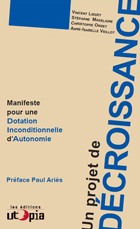In total rupture with the equation: Growth=jobs=wellbeing, some authors propose to “decolonise our imaginary” in order to leave the “religion of Growth” with its productivist corollary.
“Whoever believes that growth can be infinite in a finite world is either a madman or an economist?” deplored the American economist Kenneth Boulding 40 years ago. Today we wonder if our leaders aren’t fools advised by economists. Indeed, in 1972 a report from the Club of Rome The Limits to Growth called for “a stop on growth”. Ever since from an ecological and economic standpoint, the limits of growth have endlessly been pointed out.

Yet the overwhelming majority of politicians continue to see it as the be all and end all of every political project. In their view, salvation depends on an increase in GDP and all the diverse governments’ public policies are designed around this indicator. “My objective is employment, my guiding principle is growth”, François Hollande affirmed recently.
But the president is wrong on the destination as well as the pathway to reach it. That is what the four authors of A Degrowth Project: Manifesto for an Unconditional Autonomy Allowance argue.
Decolonise our imaginary
 “The Growth mythology entails that a growth in GDP triggers a reduction in unemployment. But if the GDP has increased gradually over the last 40 years, the unemployment level has increased to stabilise at around 10%. A certain unemployment level is inbuilt in capitalism so that work retains acertain value as a bargaining power for the employer. Therefore, growth that guarantees full employment is a myth embedded in our imaginaries”.
“The Growth mythology entails that a growth in GDP triggers a reduction in unemployment. But if the GDP has increased gradually over the last 40 years, the unemployment level has increased to stabilise at around 10%. A certain unemployment level is inbuilt in capitalism so that work retains acertain value as a bargaining power for the employer. Therefore, growth that guarantees full employment is a myth embedded in our imaginaries”.
For the authors, this wild goose chase stems back from the Glorious Thirties, an era of economic prosperity that “led us to forget about the planet’slimits and erect this belief in economic development as the sole vector of wellbeing”. Tied up by this logic:
“Our economic model is doomed to grow or die or else to grow and die”.
In total opposition to the equation: growth= jobs= wellbeing, they propose to “decolonise our imaginary” so we can leave the “religion of Growth” and its productivist corollary.
And the task is not easy since so many people worship the God of Growth. Those who are reluctant to seek him have rallied behind this provoking slogan: “Degrowth”. This term was coined by André Gorz the precursor of political ecology and co-founder of the Nouvel Observateur.
Less goods, more links
And for its proponents, Degrowth does not only aim at protecting the environment from the pillages imposed upon the planet by the productivist system. It aims at proposing the bases for a convivial society that can be summed up by Paul Ariès phrase. “Less goods, more links”.
To embark on this pathway, the authors advocate for the establishment of an Unconditional Autonomy Allowance (UAA), which implies: “that people will be guaranteed the means to lead a frugal and dignified life (lodging, food, clothing, water, energy and transport) throughout their entire life”.
This allowance would be primarily distributed as right of usage on water, electricity and housing. Each person would receive free quotas for water, electricity and housing and will be charged for any excess usage. The point is to allow everyone to have free access to resources she/he needs to survive whilst taxing misuse.
These usage rights would be complemented by a monetary allowance in local currencies enabling the purchase of locally produced goods, mainly food, produced by local producers respecting man and nature. The remaining part would be paid in Euros, so that the exchange can exist beyond the local boundaries.
Repositioning the economy in its right place
This UAA is based on the unconditional basic income. Degrowth advocates intend to go further since they fear that distributing an income in hard currencies to all strengthens “the primacy of the economic system by sharing money but not the goods. It neither questions its form nor its content”. And the authors intend to “detoxify us from economicism and to put the economy back at the service of Man rather than the reverse”.
The UAA is presented as a “social tool” since for the authors: “the first degrowth must be degrowth in inequalities”. This is why they propose to combine this UAA with a Maximum Acceptable Income (as a guide, the candidates for Europe-Degrowth proposed a ratio of 1 to 4).
To get out of the centrality of the work paradigm
Another stated objective: to get out of the centrality of work. Thanks to the UAA, citizens would no longer depend on paid work to satisfy their basic needs.
“The UAA intends to dislodge work as the sole reference and the sole basis for our social links and the only way to try to live in dignity”.
So we would transit from a society where work is endured and compelled, to a society where activity is freely chosen and meaningful. No one would be forced to “spend his/her all life producing useless goods to sell to people who don’t need them”.
By giving people the choice to work less (to spend time on personal projects, family, friends, and community or political commitments), the UAA “would put a stop to unemployment as an economic and social problem”
Away out of capitalism
But the authors go even further: they argue that the UAA offers an exit from capitalism. The aim is to put an end to the dogma of rampant commercialisation favoured by the actual economic system in favour of the expansion of the sphere of gratuitousness.
Growth Objectors (another name for Degrowth supporters) see this dotation as an engine “to repoliticise society”. They hope that the citizens will devote the extra free time to re-engage with politics and reach common decisions on what matter to them. In their view, the UAA would strengthen democracy and free us from the experts’ and professional politicians’ domination as well as engaging us in a reflexion on the organisation of society, consumption, modes of production and real needs.
Thus, the modalities of the distribution of the UAA will be “the object of a broad and open democratic debate: how much water, energy and food is considered as a right and at what level does it become a taxable product. Similarly the repartition and realisation of arduous tasks would have to be discussed collectively”.
Relocalise politics and the economy
For the authors, the local scale is best suited for the debates that will inevitably come up. It is necessary to take into account the local specificities (a Southern farmer needs more water than a Northerner one). Political and economic relocalisation also intends to raise the awareness of the consequences of our actions and to get out of the logic of “no limits”, the “ever more” that constitutes today’s guiding principles.
For the implementation of the UAA the authors have designed three convergent scenarios of “smooth transition”. The first relies on development and generalisation of already existing concrete alternatives (short circuits, community gardens, local currencies, shared housing, transition towns…) that would push public authorities to support and accompany them. This first scenario would be reinforced by the reduction and sharing of working time that would facilitate the design of alternative economic systems. Finally the third scenario postulates the implementation of an unconditional subsistence income, which will eventually become the UAA. First as a monetary allowance (in local and Euro currencies), it would gradually be distributed as usage rights following the implementation of the transition but it will always be decided democratically.
Degrowth by choice or endured recession
Despite being very rich in (good) ideas the book’s weakness is its total lack of data. Surely a willingness on the part of the authors to show their rejection of the overwhelming domination of the economy. But in a society still hooked on GDP and a return on investment, this simply allows the sceptics to dismiss all their propositions outright.
Furthermore the UAA raises more questions. In fact its implementation could not eventuate without the instauration of an maximum acceptable income, the requisition of buildings, and the re-appropriation of monetary creation. All are hard-to-swallow remedies for a (small) part of the population that has everything to lose.
To this, Vincent Liegey, one of the co-authors answers:
“The choice is between degrowth by choice and enforced recession. At the moment, the EU imposes the latter option through its austerity plans. In Greece, the ecological footprint has been reduced because people have lost everything; they consume only the minimum, when they can. They no longer work or use their car. The human consequences are devastating.
But we can see that the Greeks are developing alternative economic models: for example the potato revolution (direct sales from farmers to consumers). Some print drachmas, others implement time exchange systems (an unemployed doctor offers his/her services to an unemployed carpenter and vice versa)… This endured recession leads to the same result we are following with our Degrowth by choice. But the pathway is very different”.
The book’s success leads us to believe that “The Transition is indeed underway”.
Emmanuel Daniel
Slate.fr, Published on the 27th of June 2013




Ping : A Degrowth Project – Manifesto for an Unconditional Autonomy Allowance | Manifeste pour une Dotation Inconditionnelle d'Autonomie
Ping : « A Degrowth Project » : Yesterday’s utopia has become today’s reality! | Manifeste pour une Dotation Inconditionnelle d'Autonomie
Ping : A Degrowth Project on Slate.fr: « To...
Ping : European Green Journal: « A Degrowth Project: a strategy to counter the crisis » | Manifeste pour une Dotation Inconditionnelle d'Autonomie